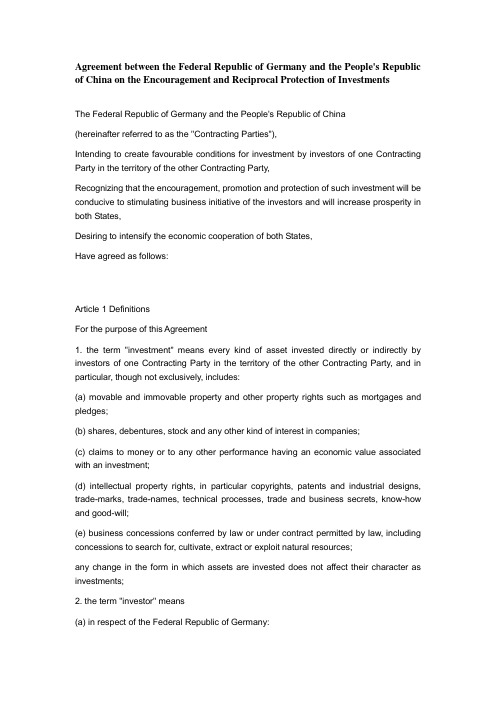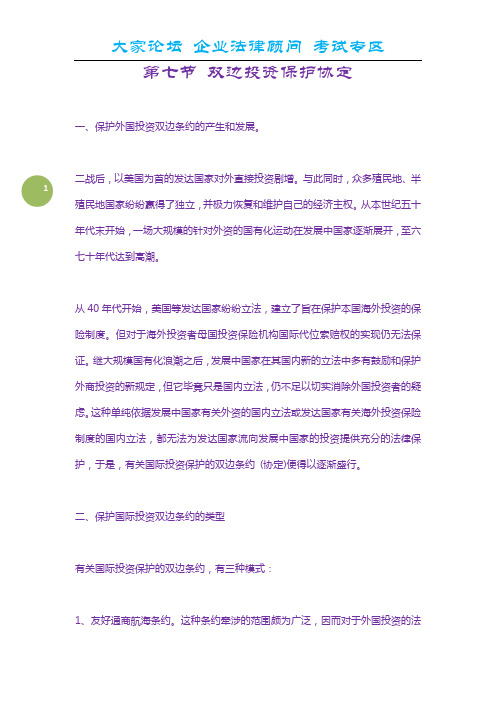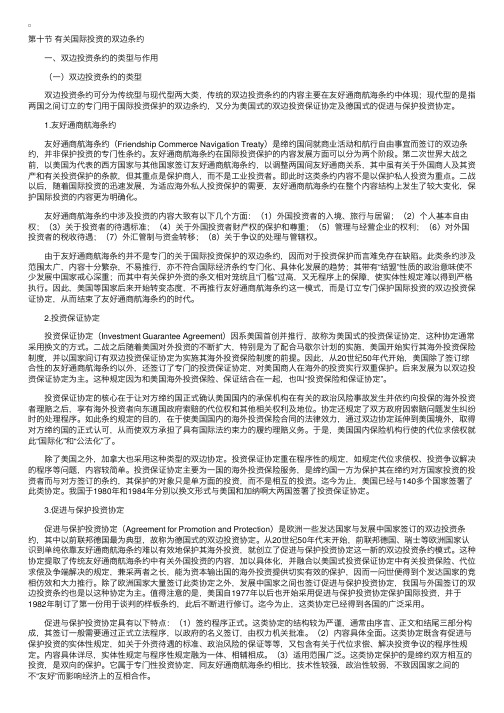双边投资协定
中德双边投资促进与保护协定及议定书

Agreement between the Federal Republic of Germany and the People's Republic of China on the Encouragement and Reciprocal Protection of InvestmentsThe Federal Republic of Germany and the People's Republic of China(hereinafter referred to as the "Contracting Parties"),Intending to create favourable conditions for investment by investors of one Contracting Party in the territory of the other Contracting Party,Recognizing that the encouragement, promotion and protection of such investment will be conducive to stimulating business initiative of the investors and will increase prosperity in both States,Desiring to intensify the economic cooperation of both States,Have agreed as follows:Article 1 DefinitionsFor the purpose of this Agreement1. the term "investment" means every kind of asset invested directly or indirectly by investors of one Contracting Party in the territory of the other Contracting Party, and in particular, though not exclusively, includes:(a) movable and immovable property and other property rights such as mortgages and pledges;(b) shares, debentures, stock and any other kind of interest in companies;(c) claims to money or to any other performance having an economic value associated with an investment;(d) intellectual property rights, in particular copyrights, patents and industrial designs, trade-marks, trade-names, technical processes, trade and business secrets, know-how and good-will;(e) business concessions conferred by law or under contract permitted by law, including concessions to search for, cultivate, extract or exploit natural resources;any change in the form in which assets are invested does not affect their character as investments;2. the term "investor" means(a) in respect of the Federal Republic of Germany:– Germans within the meaning of the Basic Law for the Federal Republic of Germany,– any juridical person as well as any commercial or other company or association with or without legal personality having its seat in the territory of the Federal Republic of German y, irrespective of whether or not its activities are directed at profit;(b) in respect of the People's Republic of China:– natural persons who have nationality of the People's Republic of China in accordance with its laws,–economic entities, including companies, corporations, associations, partnerships and other organizations, incorporated and constituted under the laws and regulations of and with their seats in the People's Republic of China, irrespective of whether or not for profit and whether their liabilities are limited or not;3. the term "return" means the amounts yielded from investments, including profits, dividends, interests, capital gains, royalties, fees and other legitimate income.Article 2 Promotion and Protection of Investment(1) Each Contracting Party shall encourage investors of the other Contracting Party to make investments in its territory and admit such investments in accordance with its laws and regulations.(2) Investments of the investors of either Contracting Party shall enjoy constant protection and security in the territory of the other Contracting Party.(3) Neither Contracting Party shall take any arbitrary or discriminatory measures against the management, maintenance, use, enjoyment and disposal of the investments by the investors of the other Contracting Party.(4) Subject to its laws and regulations, either Contracting Party shall give sympathetic consideration to applications for obtaining visas and working permits to nationals of the other Contracting Party engaging in activities associated with investments made in the territory of that Contracting Party.Article 3 Treatment of Investment(1) Investments of investors of each Contracting Party shall at all times be accorded fair and equitable treatment in the territory of the other Contracting Party.(2) Each Contracting Party shall accord to investments and activities associated with such investments by the investors of the other Contracting Party treatment not less favourable than that accorded to the investments and associated activities by its own investors.(3) Neither Contracting Party shall subject investments and activities associated with such investments by the investors of the other Contracting Party to treatment less favourable than that accorded to the investments and associated activities by the investors of any third State.(4) The provisions of Paragraphs 1 to 3 of this Article shall not be construed so as to oblige one Contracting Party to extend to the investors of the other Contracting Party the benefit of any treatment, preference or privilege by virtue of(a) any membership or association with any existing or future customs union, free trade zone, economic union, common market;(b) any double taxation agreement or other agreement regarding matters of taxation.Article 4 Expropriation and Compensation(1) Investments by investors of either Contracting Party shall enjoy full protection and security in the territory of the other Contracting Party.(2) Investments by investors of either Contracting Party shall not directly or indirectly be expropriated, nationalized or subjected to any other measure the effects of which would be tantamount to expropriation or nationalization in the territory of the other Contracting Party (hereinafter referred to as expropriation) except for the public benefit and against compensation. Such compensation shall be equivalent to the value of the investment immediately before the expropriation is taken or the threatening expropriation has become publicly known, whichever is earlier. The compensation shall be paid without delay and shall carry interest at the prevailing commercial rate until the time of payment; it shall be effectively realizable and freely transferable. Precautions shall have been made in an appropriate manner at or prior to the time of expropriation for the determination and payment of such compensation. At the request of the investor the legality of any such expropriation and the amount of compensation shall be subject to review by national courts, notwithstanding the provisions of Article 9.(3) Investors of either Contracting Party shall enjoy most-favoured-nation treatment in the territory of the other Contracting Party in respect of the matters provided for in this Article.Article 5 Compensation for Damages and LossesInvestors of either Contracting Party whose investments suffer losses in the territory of the other Contracting Party owing to war or other armed conflict, revolution, a state of national emergency or revolt, shall be accorded treatment by such other Contracting Party not less favourable than that which the latter Contracting Party accords to its own investors or to investors of any third State as regards restitution, indemnification, compensation or other valuable consideration.Article 6 Repatriation of Investments and Returns(1) Each Contracting Party shall guarantee to the investors of the other Contracting Party the transfer of their investments and returns held in its territory, including:(a) the principal and additional amounts to maintain or increase the investment;(b) returns;(c) proceeds obtained from the total or partial sale or liquidation of investments or amounts obtained from the reduction of investment capital;(d) payments pursuant to a loan agreement in connection with investments;(e) payments in connection with contracting projects;(f) earnings of nationals of the other Contracting Party who work in connection with an investment in its territory.(2) Each Contracting Party shall guarantee to the investors of the other Contracting Party the free transfer of compensation and other payments under Article 4 and 5.(3) The transfer mentioned above shall be made without delay in a freely convertible currency and at the prevailing market rate of exchange applicable within the Contracting Party accepting the investments and on the date of transfer. In the event that the market rate of exchange does not exist, the rate of exchange shall correspond to the cross rate obtained from those rates which would be applied by the International Mone tary Fund on the date of payment for conversions of the currencies concerned into Special Drawing Rights.Article 7 SubrogationIf one Contracting Party or its designated agency makes a payment to its investor under a guarantee given in respect of an investment made in the territory of the other Contracting Party, the latter Contracting Party shall recognize the assignment of all the rights and claims of the indemnified investor to the former Contracting Party or its designated agency, by law or by legal transactions, and the right of the former Contracting Party or its designated agency to exercise by virtue of subrogation any such right to same extent as the investor. As regards the transfer of payments made by virtue of such assigned claims, Article 6 shall apply mutatis mutandis.Article 8 Settlement of Disputes between Contracting Parties(1) Any dispute between the Contracting Parties concerning the interpretation or application of this Agreement shall, as far as possible, be settled with consultation through diplomatic channel.(2) If a dispute cannot thus be settled within six months, it shall, upon the request of either Contracting Party, be submitted to an ad-hoc arbitral tribunal.(3) Such tribunal comprises three arbitrators. Within two months of the receipt of the written notice requesting arbitration, each Contracting Party shall appoint one arbitrator. Those two arbitrators shall, within further two months, together select a national of a third State having diplomatic relations with both Contracting Parties as Chairman of the arbitral tribunal.(4) If the arbitral tribunal has not been constituted within four months from the receipt ofthe written notice requesting arbitration, either Contracting Party may, in the absence of any other agreement, invite the President of the International Court of Justice to make any necessary appointments. If the President is a national of either Contracting Party or is otherwise prevented from discharging the said functions, the Member of the International Court of Justice next in seniority who is not a national of either Contracting Party or is not otherwise prevented from discharging the said functions shall be invited to make such necessary appointments.(5) The arbitral tribunal shall determine its own procedure. The arbitral tribunal shall reach its award in accordance with the provisions of this Agreement and the principles of international law recognized by both Contracting Parties.(6) The arbitral tribunal shall reach its award by a majority of votes. Such award shall be final and binding upon both Contracting Parties. The arbitral tribunal shall, upon the request of either Contracting Party, explain the reasons of its award.(7) Each Contracting Party shall bear the costs of its appointed arbitrator and of its representation in arbitral proceedings. The relevant costs of the Chairman and tribunal shall be borne in equal parts by the Contracting Parties.Article 9 Settlement of Disputes between Investors and one Contracting Party(1) Any dispute concerning investments between a Contracting Party and an investor of the other Contracting Party should as far as possible be settled amicably between the parties in dispute.(2) If the dispute cannot be settled within six months of the date when it has been raised by one of the parties in dispute, it shall, at the request of the investor of the other Contracting State, be submitted for arbitration.(3) The dispute shall be submitted for arbitration under the Convention of 18 March 1965 on the Settlement of Investment Disputes between States and Nationals of Other States (ICSID), unless the parties in dispute agree on an ad-hoc arbitral tribunal to be established under the Arbitration Rules of the United Nations Commission on the International Trade Law (UNCITRAL) or other arbitration rules.(4) Any award by an ad-hoc tribunal shall be final and binding. Any award under the procedures of the said Convention shall be binding and subject only to those appeals or remedies provided for in this Convention. The awards shall be enforced in accordance with domestic law.Article 10 Other Obligations(1) If the legislation of either Contracting Parties or obligations under international law existing at present or established hereafter between the Contracting Parties in addition to this Agreement contain a regulation, whether general or specific, entitling investments by investors of the other Contracting Party to a treatment more favourable than is providedfor by this Agreement, such regulation shall to the extent that it is more favourable prevail over this Agreement.(2) Each Contracting Party shall observe any other obligation it has entered into with regard to investments in its territory by investors of the other Contracting Party.Article 11 ApplicationThis Agreement shall apply to investments, which are made prior to or after its entry into force by investors of either Contracting Party in accordance with the laws and regulations of the other Contracting Party in the territory of the latter.Article 12 Relations between Contracting PartiesThe provisions of the present Agreement shall apply irrespective of the existence of diplomatic or consular relations between the Contracting Parties.Article 13 ConsultationsEither Contracting Party may propose to the other Contracting Party that consultations be held on any matter concerning interpretation, application and implementation of the Agreement. The other Contracting Party shall accord sympathetic consideration to the proposal and shall afford adequate opportunity for such consultations.Article 14 ProtocolThe attached protocol shall form an integral part of this Agreement.Article 15 Entry into Force, Duration and Termination(1) This Agreement shall enter into force one month from the date on which both Contracting Parties have notified each other in writing that the national requirements for such entry into force have been fulfilled. The relevant date shall be the day on which the last notification is received.(2) This Agreement shall remain in force for a period of ten years and shall be extended thereafter for an unlimited period unless denounced in writing through diplomatic channels by either Contracting Party twelve months before its expiration.(3) After the expiration of the initial ten years period, either Contracting Party may at any time thereafter terminate this Agreement by giving at least twelve month's written notice through diplomatic channels to the other Contracting Party.(4) With respect to investments made prior to the date of termination of this Agreement, the provisions of Article 1 to 14 shall continue to be effective for a further period of twenty years from such date of termination.Article 16 Transition(1) Upon entry into force of this Agreement the Agreement of 7 October 1983 between theFederal Republic of Germany and the People's Republic of China on the Encouragement and Reciprocal Protection of Investments shall terminate.(2) The present Agreement shall apply to all investments made by investors of either Contracting Party in the territory of the other Contracting Party, whether made before or after the entry into force of this Agreement, but shall not apply to any dispute or any claim concerning an investment which was already under judicial or arbitral process before its entry into force. Such disputes and claims shall continue to be settled according to the provisions of the Agreement of 7 October 1983 mentioned in paragraph 1 of this Article.Done at Beijing on December 1, 2003 in duplicate in the German, Chinese and English languages, all texts being authentic. In case of divergent interpretation of the German and the Chinese text, the English text shall prevail.For the People's Republic of China For the Federal Republic of GermanyYu Guangzhou ChrobogProtocol to the Agreement between the Federal Republic of Germany and the People's Republic of China on the Encouragement and Reciprocal Protection ofInvestmentsOn signing the Agreement between the Federal Republic of Germany and the People's Republic of China on the Encouragement and Reciprocal Protection of Investments, the plenipotentiaries, being duly authorized, have, in addition, agreed on the following provisions, which shall be regarded as an integral part of the said Agreement:1. Ad Article 1(a) For the avoidance of doubt, the Contracting Parties agree that investments as defined in Article 1 are those made for the purpose of establishing lasting economic relations in connection with an enterprise, especially those which allow to exercise effective influence in its management.(b) "Invested indirectly" means invested by an investor of one Contracting Party through a company which is fully or partially owned by the investor and having its seat in the territory of the other Contracting Party.(c) Returns from the investment and from reinvestments shall enjoy the same protectionas the investment.2. Ad Article 2The Agreement shall apply to the territory of each Contracting Party including the territorial sea as well as to the areas of the exclusive economic zone and the contin ental shelf insofar as international law permits the Contracting Party concerned to exercise sovereign rights or jurisdiction in these areas.3. Ad Article 2 and 3With regard to the People's Republic of China paragraph 3 of Article 2 and paragraph 2 of Article 3 do not apply to(a) any existing non-conforming measures maintained within its territory;(b) the continuation of any such non-conforming measure;(c) any amendment to any such non-conforming measure to the extent that the amendment does not increase the non-conformity of these measures.The People's Republic of China will take all appropriate steps in order to progressively remove the non-conforming measures.4. Ad Article 3(a) The following shall more particularly, though not exclusively, be deemed "activity" within the meaning of Article 3 (2): the management, maintenance, use, enjoyment and disposal of an investment. The following shall, in particular, be deemed "treatment less favourable" within the meaning of Article 3: unequal treatment in the case of restrictions on the purchase of raw or auxiliary materials, of energy or fuel or of means of production or operation of any kind as well as any other measures having similar effects. Measures that have to be taken for reasons of public security and order, public health or morality shall not be deemed "treatment less favourable" within the meaning of Article 3.(b) The provisions of Article 3 do not oblige a Contracting Party to extend to investors resident in the territory of the other Contracting Party tax privileges, tax exemptions and tax reductions which according to its tax laws are granted only to investors resident in its territory.5. Ad Article 6(a) With regard to the People's Republic of China:–Article 6, paragraph 1 (c) will apply provided that the transfer shall comply with the relevant formalities stipulated by the present Chinese laws and regulations relating to exchange control.– Article 6, paragraph 1 (d) will apply provided that a loan-agreement has been registered with the relevant foreign exchange administration authority.To the extent that the formalities mentioned above are no longer required according to the relevant provisions of Chinese law, Article 6 shall apply without restrictions.(b) A transfer shall be deemed to have been made "without delay" within the meaning of Article 6 (3) if effected within such period as is normally required for the completion of transfer formalities. The said period shall commence on the day on which the relevant request has been submitted to the relevant foreign exchange administration with full and authentic documentation and information and may on no account exceed two months.6. To Article 9With respect to investments in the People's Republic of China an investor of the Federal Republic of Germany may submit a dispute for arbitration under the following conditions only:(a) the investor has referred the issue to an administrative review procedure according to Chinese law,(b) the dispute still exists three months after he has brought the issue to the review procedure, and(c) in case the issue has been brought to a Chinese court, it can be withdrawn by the investor according to Chinese law.7. The investors of either Contracting Party are free to choose international means of transport for the transport of persons and/or capital-goods directly connected with an investment within the meaning of this Agreement.For the People's Republic of China For the Federal Republic of GermanyYu Guangzhou Chrobog。
双边投资协定

1.3 BIT的地位与作用
双边投资协定能够在近十几年来迅速发展,主要原因在于:无 论是投资输出国还是投资输入国都相信,双边投资协定的签署—— 可以扫清投资进入障碍,为投资提供更有效保护,促进国际投资的 增长。国际投资者期望通过双边投资协定,建立一个更透明、更稳 定、更具有可预期性和更加安全的国际投资政策环境,以此保证国 际投资的顺利进行。对于大多数发展中国家来说,主动参与到双边 投资协定中,表明了其改善投资环境、发展经济的决心。这些国家 普遍希望通过签订双边投资协定吸引国际投资,促进国家经济发展。 双边投资协定近十几年的发展实践,部分实现了这些目标。但是其 对于国际投资流动、国际投资政策环境和发展中国家经济发展的影 响还需要进一步的跟踪和研究。
2.3 中国BIT的晚近转型——2008年至今的平衡 模式
近年来,投资者根据国际投资协定起诉东道国的案件频频发生, 为东道国的主权规制提出了严峻挑战,自由化模式下的国际投资法 危机四起。在见证美国、希腊的仲裁危机之后,出于对自由模式弊 端的修正,中国正在酝酿中式BIT的又一次重要转型,试图通过对 条约实体和程序内容的改革寻求投资者与东道国之间的利益平衡。 以2008年9月正式启动的中美投资保护协定谈判为起点,以2010年 中国BIT范本修订、中日韩三边投资协定的签订、中加BIT的达成为 标志,中式BIT在提高投资者待遇基础之上,开始寻求一种更为平 衡的模式来调整投资者与东道国之间的关系。
双边投资协定制度

双边投资协定制度在我国已经签署的110多个双边投资协定〔BITs〕中,有17个规定了国民待遇,而各个BITs 中有关国民待遇的定义、适用对象、适用标准等的具体措辞并不一致。
审视我国BITs中有关国民待遇制度的利弊得失并积极寻求完善我国双边投资立法的对策,对于改善我国的投资法律环境和实现内外资的平等待遇具有重要的现实意义。
双边投资协定国民待遇重构在国际投资法领域,投资待遇一直是一个备受关注的问题。
近年来,国民待遇在多边和双边投资协定中被广泛采用,代表了国际投资法领域的最新开展趋势。
甚至有学者主张,国民待遇已经成为外资待遇的一般准那么。
据统计,迄至2005年底,我国已经与117个国家缔结了“双边投资协定〞〔BITs〕。
1目前,我国正在积极与一些国家进行缔结BITs的谈判或修订原有的BITs.从我国BITs的实践来看,我国对外资待遇所采用的标准主要有最惠国待遇、公平与公正待遇以及国民待遇。
其中,只有17个BITs规定了国民待遇,而这17个BITs中有关国民待遇的定义、适用对象、适用标准等的具体措辞并不一致。
一、我国BITs中国民待遇制度存在的问题〔一〕有关国民待遇的规定不适应形势开展的需要迄今为止,中国签订的117个BITs中,只有17定了国民待遇,其他的都只规定公平公正待遇和最惠国待遇。
这种现状与当今国际投资法领域投资自由化的开展趋势完全不相适应,也与我国作为世界上吸收国际直接投资最多的国家之一的经济大国地位极不相称,不利于内外资在平等根底上进行公平竞争。
诚然,是否接受国民待遇以及在什么程度上接受国民待遇属于一国国内法管辖事项,必须根据本国国情作出适当的选择。
上世纪八九十年代我国不接受或是有条件地接受国民待遇是鉴于我国当时的国情考虑,是正确的。
但是,经过20多年吸收外资的实践和开展,我国的经济实力已经发生了根本性的变化,也就是说,国情已经变了。
既然国情变化了,那么政策也必须跟着改变。
随着市场经济体制确实立,对外开放的进一步扩大以及经济国际化程度的不断加深,我国这种事实上有限的国民待遇已不能适应形势开展的需要。
双边投资协定与仲裁机制

推动双边投资协定和仲裁机制完善和发展
要点一
制定和执行双边投资 协定
各国应积极制定和执行双边投资协定 ,明确投资保护的标准和范围,为投 资者提供充分的法律保障。同时,协 定应适应国际投资的新形势和新挑战 ,不断完善和发展。
要点二
完善仲裁机制
各国应加强对仲裁机制的研究和探讨 ,不断完善仲裁规则和程序,提高仲 裁的公正性、效率和可执行性。同时 ,应积极推广仲裁解决投资争议的方 式,为投资者提供更加便捷和有效的 争议解决途径。
障。
THANKS
感谢观看
法律适用问题
双边投资协定通常规定适用东道 国法律和国际法原则,但具体适 用哪些法律和国际法原则往往存 在争议。
裁决的承认与执行
难题
尽管《纽约公约》等国际条约规 定了仲裁裁决的承认与执行机制 ,但在实践中,东道国可能以公 共秩序保留等为由拒绝承认与执 行仲裁裁决。
改进建议与措施
完善双边投资协定条款
明确投资定义、用尽当地救济原则、法律适用等问题,减少管辖 权争议和法律适用问题。
加强国际合作
推动各国在双边投资协定中纳入《纽约公约》等国际条约的规定, 提高仲裁裁决的承认与执行效率。
建立上诉机制
探讨在双边投资协定中引入上诉机制的可能性,为投资者和东道国 提供更为公正、合理的纠纷解决途径。
06
国际合作与交流在推动双边投资 协定和仲裁机制中作用
加强国际合作与交流重要性
促进国际投资合作
调解
如果协商和谈判无果,双方可以选择调解方式。调解人作 为中立的第三方,协助双方达成和解协议。调解具有保密 性、灵活性等优点。
仲裁
当协商、谈判和调解均无法解决争议时,双方可以选择仲 裁方式。仲裁具有专业性、公正性和终局性等特点,能够 为双方提供具有法律约束力的裁决。
第七节 双边投资保护协定

1第七节双边投资保护协定一、保护外国投资双边条约的产生和发展。
二战后,以美国为首的发达国家对外直接投资剧增。
与此同时,众多殖民地、半殖民地国家纷纷赢得了独立,并极力恢复和维护自己的经济主权。
从本世纪五十年代末开始,一场大规模的针对外资的国有化运动在发展中国家逐渐展开,至六七十年代达到高潮。
从40年代开始,美国等发达国家纷纷立法,建立了旨在保护本国海外投资的保险制度。
但对于海外投资者母国投资保险机构国际代位索赔权的实现仍无法保证。
继大规模国有化浪潮之后,发展中国家在其国内新的立法中多有鼓励和保护外商投资的新规定,但它毕竟只是国内立法,仍不足以切实消除外国投资者的疑虑。
这种单纯依据发展中国家有关外资的国内立法或发达国家有关海外投资保险制度的国内立法,都无法为发达国家流向发展中国家的投资提供充分的法律保护,于是,有关国际投资保护的双边条约(协定)便得以逐渐盛行。
二、保护国际投资双边条约的类型有关国际投资保护的双边条约,有三种模式:1、友好通商航海条约。
这种条约牵涉的范围颇为广泛,因而对于外国投资的法2律保护这一特定问题的规定往往欠明确、具体,美国等国家在1960年后就不再推行“友好通商航海条约"这一双边条约模式了。
2、投资保证协议。
此类双边协议的核心在于让对方缔约国正式确认美国国内的承保机构在有关的政治风险事故发生并依约向投保的海外投资者理赔之后,享有海外投资者向东道国政府索赔的代位权和其他相关权利及地位。
3、促进和保护投资协定。
此类协定内容详实具体,实体性规定和程序性规定并举,能够为资本输出国的海外投资提供切实有效的保护,因而一问世便得到各发达国家的竞相效仿和大力推行。
而且也为发展中国家所广泛接受。
三、双边投资保护协定的主要内容:当代各国所缔结的双边投资保护协定一般包含投资定义、批准、待遇、代位权、征收条件和补偿以及争端解决程序等条款,其内容往往是资本输出国和资本输入国利益平衡和互相妥协的结果。
自考“国际经济法概论”各章重点(8)

第⼗节有关国际投资的双边条约 ⼀、双边投资条约的类型与作⽤ (⼀)双边投资条约的类型 双边投资条约可分为传统型与现代型两⼤类,传统的双边投资条约的内容主要在友好通商航海条约中体现;现代型的是指两国之间订⽴的专门⽤于国际投资保护的双边条约,⼜分为美国式的双边投资保证协定及德国式的促进与保护投资协定。
1.友好通商航海条约 友好通商航海条约(Friendship Commerce Navigation Treaty)是缔约国间就商业活动和航⾏⾃由事宜⽽签订的双边条约,并⾮保护投资的专门性条约。
友好通商航海条约在国际投资保护的内容发展⽅⾯可以分为两个阶段。
第⼆次世界⼤战之前,以美国为代表的西⽅国家与其他国家签订友好通商航海条约,以调整两国间友好通商关系,其中虽有关于外国商⼈及其资产和有关投资保护的条款,但其重点是保护商⼈,⽽不是⼯业投资者。
即此时这类条约内容不是以保护私⼈投资为重点。
⼆战以后,随着国际投资的迅速发展,为适应海外私⼈投资保护的需要,友好通商航海条约在整个内容结构上发⽣了较⼤变化,保护国际投资的内容更为明确化。
友好通商航海条约中涉及投资的内容⼤致有以下⼏个⽅⾯:(1)外国投资者的⼊境、旅⾏与居留;(2)个⼈基本⾃由权;(3)关于投资者的待遇标准;(4)关于外国投资者财产权的保护和尊重;(5)管理与经营企业的权利;(6)对外国投资者的税收待遇;(7)外汇管制与资⾦转移;(8)关于争议的处理与管辖权。
由于友好通商航海条约并不是专门的关于国际投资保护的双边条约,因⽽对于投资保护⽽⾔难免存在缺陷。
此类条约涉及范围太⼴,内容⼗分繁杂,不易推⾏,亦不符合国际经济条约专门化、具体化发展的趋势;其带有“结盟”性质的政治意味使不少发展中国家戒⼼深重;⽽其中有关保护外资的条⽂相对笼统且“门槛”过⾼,⼜⽆程序上的保障,使实体性规定难以得到严格执⾏。
因此,美国等国家后来开始转变态度,不再推⾏友好通商航海条约这⼀模式,⽽是订⽴专门保护国际投资的双边投资保证协定,从⽽结束了友好通商航海条约的时代。
第十四章国际多双边投资协定介绍

(3)国民待遇和最惠国待遇:这些待遇通常以具体
的标准予以描述,如禁止任意的或歧视性的措施,有 义务遵守有关投资的承诺。一般给予国民待遇,但有 若干限制和例外。所有的双边投资协定都包括保证最 惠国待遇的条款。
(4)没收和补偿:所有的双边投资协定都承认东道
国拥有在一定条件下没收财产的权利,但这种没收必
友好通商航海条约所调整的对象和规定的内容主
要为确认缔约国之间的友好关系,双方对于对方国民
前来从事商业活动应给予应有的保障,赋予航海上的 自由权等。但此类条约由于范围较大,对于外国投资 者的法律保护往往缺乏具体的规定。这类条约主要为 早期的一些双边协定。
(二)双边投资保证协定
为弥补友好通商航海条约的缺陷,从20世纪50年
又称《汉城公约》,并于1985年10月正式通过。根据
该公约,于1988年4月建立了多边投资担保机构 (Multilateral Investment Guarantee Agency,缩 写为MIGA),它在财务和法律上是一个独立于世界银 行的实体,有自己的业务和法律人员,以进一步加强
法律保障。
(2)《汉城公约》的宗旨 根据公约的规定,MIGA的目标是通过自身业务活 动来推动成员国相互之间进行以生产为目的的投资,
(1)明确表明解决双边税收问题的目标,界定有关
法人或自然人及征税的适用范围;
(2)对于各类收入,如:在来源国可不加限制予以 征税的不动产收入和在来源国征税的利息收入的详细 分配原则; (3)以正常交易原则作为税收部门对关联企业内部 交易所用的转移价格进行调整的标准;
(4)当收入在来源国征税时,在居住国免税或对国 外税款抵免优待的规则;
入税中扣除在来源国已缴纳的税款。
ቤተ መጻሕፍቲ ባይዱ
双边投资条约

• 投资保证协定是美国首创并推行,故称为美国式的投资保证协定,这种协定通常采 用换文的方式。二战之后随着美国对外投资的不断扩大,特别是为了配合马歇尔计 划的实施,美国开始实行其海外投资保险制度,并以国家间订有双边投资保证协定 为实施其海外投资保险制度的前提。因此,从20世纪50年代开始,美国除了签订 综合性的友好通商航海条约以外,还签订了专门的投资保证协定,对美国商人在海 外的投资实行双重保护。后来发展为以双边投资保证协定为主。这种规定因为和美 国海外投资保险、保证结合在一起,也叫“投资保险和保证协定”。
• 与国际贸易领域不同,在国际投资方面至今仍缺乏一个规范国际 投资的全球性的和多边性的法律框架,有关国际投资的国际法和 国际准则主要依赖国与国之间签订的“双边投资保护协议”和 “自由贸易协议”中的投资章节,即国际上统称“国际投资协 议”(International Investment Agreements,简称 IIA)的运作来 体现。
• 二战以后,随着国际投资的迅速发展,为适应海外私人投资保护 的需要,友好通商航海条约在整个内容结构上发生了较大变化, 保护国际投资的内容更为明确化。
友好通商航海条约中涉及投资的内容
• (1)外国投资者的入境、旅行与居留; • (2)个人基本自由权; • (3)关于投资者的待遇标准; • (4)关于外国投资者财产权的保护和尊重; • (5)管理与经营企业的权利; • (6)对外国投资者的税收待遇; • (7)外汇管制与资金转移; • (8)关于争议的处理与管辖权。
• 从20世纪50年代末开始,前联邦德国、瑞士等欧洲国家认识到单纯依靠友好通商 航海条约难以有效地保护其海外投资,就创立了促进与保护投资协定这一新的双边 投资条约模式。这种协定提取了传统友好通商航海条约中有关外国投资的内容,加 以具体化,并融合以美国式投资保证协定中有关投资保险、代位求偿及争端解决的 规定,兼采两者之长,能为资本输出国的海外投资提供切实有效的保护,因而一问 世便得到个发达国家的竞相仿效和大力推行。除了欧洲国家大量签订此类协定之外, 发展中国家之间也签订促进与保护投资协定,我国与外国签订的双边投资条约也是 以这种协定为主。值得注意的是,美国自1977年以后也开始采用促进与保护投资 协定保护国际投资,并于1982年制订了第一份用于谈判的样板条约,此后不断进 行修订。迄今为止,这类协定已经得到各国的广泛采用。
- 1、下载文档前请自行甄别文档内容的完整性,平台不提供额外的编辑、内容补充、找答案等附加服务。
- 2、"仅部分预览"的文档,不可在线预览部分如存在完整性等问题,可反馈申请退款(可完整预览的文档不适用该条件!)。
- 3、如文档侵犯您的权益,请联系客服反馈,我们会尽快为您处理(人工客服工作时间:9:00-18:30)。
BITs中国的重大安全例外条款实践应当引起反思。
作为最大的发中国家资本输入国,尤其是在与荷兰、韩国等发达国家签订双边投资条约时全同意了ICSID仲裁庭管辖权,却没有设置重大安全例外条款;即使在与印度、兰签订的双边投资条约中规定了重大安全例外条款,也存在许多问题,比如没采用自行判断的重大安全例外条款,无法限制仲裁庭的审查范围,无法将涉及大安全例外条款的事项排除仲裁庭管辖之外。
这些漏洞使我国如果在国家危机形下采取措施保护本国基本利益却无法成功援引重大安全例外条款而使国家免责。
因此,我们需要借鉴国外重大安全例外条款的经验和教训,进一步严格我的重大安全例外条款立法、使其更具有可操作性,在使用重大安全例外条款时法可依。
1.通过列举的方式对相关基本用语进行明确界定明确规定“基本安全利益”和“社会公共秩序”的含义和范围。
将缔约双方均同的对一国具有重大意义的利益,如经济稳定,军事安全,生态安全,公共健等采取列举的方式进行界定,同时设置兜底条款,将概念扩大到其他重要情势以此限制国际投资仲裁庭的自由裁量权,保证东道国在该条款上核心利益得到仲裁庭的尊重,为东道国保留核心安全利益。
2.赋予东道国自行判断本国是否存在紧急状态情势的权利借鉴国外相对成熟的立法,限制仲裁庭的自由裁量权,防止其对我国援引重大安全例外条款的行为进行全面的实质性的审查。
明确规定自行判断的重大安全例外条款,以保留一定的主权权力使东道国在紧急状态下可以采取措施维护本国的国家安全,但是同时应该规定东道国援引该条款的标准,为避免该条款被滥用,赋予国际仲裁庭根据该标准审查东道国行为合法性的权力。
3.明确规定国家对受损害方的责任明确规定如果援引重大安全例外条款排除了国家行为的违法性,同时也免除了东道国的物质赔偿责任。
如果没有明确规定,仲裁庭可能会适用国际习惯法,正如CMS案件,适用了《条文草案》第27条的规定。
虽然第27条并未强制要求东道国赔偿投资者的损失,但是赋予仲裁法庭较大的裁量权,其有可能裁决东道国对投资者的经济损失承担责任。
目前中国的海外投资日益增多,但从总体来上来说是个资本输入大国,根本上说,重大安全例外条款是一个利益选择问题,因此对重大安全例外条款的风险分担,中国应更多从本国实际情况出发,考虑作为东道国的主权权力和利益,明确规定根据重大安全例外条款采取的措施造成的损失不具有赔偿性,或者从平衡投资者和东道国利益角度出发,将这一条款界定为部分具有赔偿性。
_4.明确规定国际条约优先于国际习惯法适用同时应当重视争端解决的程序问题,明确规定国际条约优先适用于国际习惯法,仲裁庭应当主要适用BIT的重大安全例外条款,并在必要的时候将习惯国际法作为补充,以此确保控制个案仲裁庭对法律的适用。
在阿根廷案件中,案情[22l陈安主编:《国际经济法学年刊》,北京大学出版社2010。
几乎完全一样,援引的抗辩条款也一样,只是因为仲裁庭适用的法律不同,就得出完全截然相反的裁决,这是我国在缔结重大安全例外条款时应当考虑的一个方面。
5.借鉴国外有关重大安全例外条款的缔约方式中国双边投资条约可以借鉴2000年墨西哥一瑞典BIT的体例,将东道国为了国家安全目的采取的措施排除在争端解决程序之外;或者借鉴2002年印度一加纳BIT的规定,要求投资者遵守东道国有关国家安全的立法或者在极端紧急状态情况下通过的法律。
结论重大安全例外条款是双边投资条约中不可或缺的条款,发挥着“安全阀”和“风险调配器”的作用,对东道国来说具有重要的意义。
因此,我们在双边投资条约的谈判中,应当保持清醒的头脑,从我国国情出发,吸取国外重大安全例外条款立法的经验和教训,充分利用和设计重大安全例外条款,让其成为投资条约的“安全阀’,,为我国政府管理权限留下更大的空间,保护我国的基本安全利益。
在本文中,就完善重大安全例外条款提出以下五点建议:1.通过列举的方式对相关基本用语进行明确界定,2.赋予东道国自行判断本国是否存在紧急状态情势的权利,3.明确规定国家对受损害方的责任,4.明确规定国际条约优先于国际习惯法适用,5.借鉴国外有关重大安全例外条款的缔约方式。
重大安全例外条款指东道国采取措施保护本国基本安全利益和维护本国公共秩序的条款,是双边投资条约中不可或缺的条款,依据其作用可以形象的称之为“安全阀”及“风险调配器”。
双边投资条约是保护投资者强有力的法律武器,其为跨境投资者提供了长远的保障。
一般对于双边投资条约的理解是东道国签订条约以承担保护外国投资者利益的义务,如果东道国违反了条约的规定而损害了外国投资者的利益,东道国应当承担相应的赔偿责任。
然而重大安全例外条款则通过预先免除特定情况下东道国的条约义务,给一国的管制权限留下较大的空间,在条约规定的特定情况下,东道国为保护本国的基本利益可以采取应对危机甚至损害投资者利益的措施。
因此,对于东道国的主权权力,重大安全例外条款发挥着“安全阀”的作用。
此外,东道国采取的措施损害了投资者的利益,违反了其签订双边投资条约所规定的义务,应当赔偿投资者的物质损失,但是如果符合重大安全例外条款规定的特定情形并以此提出抗辩,东道国可以免除其责任,不必向投资者赔偿,如此一来,东道国就把风险转移到了投资者身上。
因此我们认为重大安全例外条款起着“风险分配器”的作用。
采用有限同意式于中国与发达国家签订的BITs 主要原因在于针对几种特定类型的争端同意接受中心管辖有助于消除发达国家投资者的疑虑, 同时不会明显削弱我国管理宏观经济的权力。
如果我国在某些发达国家从事较大规模的投资, 考虑到在我国与该发达国家签订的BITs已经针对某些类型的争端规定了国际救济措施, 而发达国家的法律制度总是较为完善、政府行为较为高效透明、司法独立较有保障、政府违法侵权的可能性较小, 即使侵权也可以通过国内司法途径较好地得到解决, 这种同意方式能够较好地保护我国海外投资。
相较之下, 如果把有限同意式适用于中国与其他发展中国家间签订BITs 则可能不足以保护我国对外投资, 尤其是能源、原材料方面的投资。
随着经济的不断发展, 中国对能源和原材料进口的依赖程度越来越高, 最有效的解决方式就是加快走出去的步伐, 加大在能源、原材料领域对外投资的力度, 使我国能源、原材料供应多元化。
因此通过在BITs 中实行全面同意附加重要例外式, 有助于对这些投资数额巨大、投资周期较长因而较有可能遇到政治风险的海外投资提供有效保护。
所谓的全面同意附加重要例外式是指在BIT s 中概括接受中心管辖权, 但同时把一些容易发生争端且关系到国计民生、重大国际利益的敏感领域排除在中心管辖范围之外, 这是先全面同意中心的管辖权, 再逐项规定例外。
美国、加拿大等国近年来采用此种方式较多。
如果投资目的地是那些经济与政治局势不太稳定的国家, 尤其是发展中国家, 这种同意方式的意义显著。
全面同意附加重大例外式也可以考虑采用于其他发展中国家。
因为中国目前有些较高技术产业生产能力严重过剩, 急需寻找国外市场。
然而, 由于各种关税壁垒与非关税壁垒等原因, 到国外去投资建厂就成为中国公司的优先选择。
而发展中国家更低的劳动力等生产成本使得这种选择更加容易达到预期目的。
随着我国经济的快速发展, 作出此种选择的我国公司会越来越多。
因此在中国与发展中国家签订BIT s 时, 都可以采用全面同意附加重要例外式。
当然, 根据对方的具体经济、政治和法律状况其中的重要例外应当加以相应的改变。
(二) 使用用尽当地救济原则如前所述, 中国对外签订BITs 时, 对用尽当地救济规则做出明确具体的规定十分重要, 这可以避免国际仲裁庭在审查有关用尽当地救济问题时作出任意扩大或歪曲的解释。
目前中国BIT s 中用尽当地救济规则仅限于用尽东道国的法律和法规所规定的国内行政复议程序, 之所以没有把用尽国内司法救济作为提交国际仲裁的前提,其原因主要是避免内国司法判决受到国际仲裁庭的审查,甚至被仲裁庭事实上推翻从而对我国的司法主权和司法尊严造成损害。
并且, 我国目前在BITs 中规定外国投资者可自由选择东道国国内法院管辖或国际仲裁庭管辖, 但这两种管辖权是相互排斥的, 选择一旦作出, 具有终局性。
不过, 更有利于投资者的规定是在内国法院作出判决前,如果投资者根据东道国法律撤回了诉讼请求, 那么仍然可以提交国际仲裁庭裁决。
在今后签订BIT s时还是不应否定与放弃用尽当地救济原则,并且在对国内救济与国际救济的关系问题上, 应该以国际救助为国内救助的补充, 但这种补充并非是为了弥补国内救助之不足, 而是为外国投资者多提供一种救济方式, 给外国投资者创造一个较好的投资环境。
其实ICSID公约6第26条的设置也是这样的意思) ) )在缔约国要求下, 中心仲裁可以是国内救济的补充, 缔约国可以根据具体情况恰当处理好国内救济和国际救济的关系。
采用以国际救济为国内救济的补充, 既坚持了国家属地管辖权的原则, 同时也没有排除国际救助的可能性。
虽然有些学者认为这种方式会是中心审查国内救济的公正性, 是有损于认为这种方式会是中心审查国内救济的公正性, 是有损于我国主权的, 但正如有些学者指出的, 中心管辖并不是传统意义上的国际求偿方式, 它不是对东道国的行为作评判,看其是否违反国际法, 以追究其国际责任, 它只是提供一种为东道国与外国投资者双方均能接受的渠道, 以便妥善友好地处理他们之间的争议。
所以今后处理BIT s中有ICSID 管辖的用尽当地救济问题时, 应以国际救济为国内救济的补充。
中国当前BITs出现的风险、问题风险:1.重大安全例外条款的缺失中国正在以一些发达国家的BITS为范本,积极的对外签订新式的双边投资协定,提高对投资者的保护,让渡出一部分主权权力,使我国吸引外资,扩大对外投资的能力大大提高。
传统上我国的双边投资条约对重大安全例外条款的规定少之又少,这种“门户洞开,毫不设防”的局面大大增加了我国投资仲裁的风险。
2. 有关BIT s 概括同意中心仲裁庭的管辖权而在1998年开始, 我国出于引进外资的需要逐渐开始采用全面同意式有关BIT s 概括同意中心仲裁庭的管辖权, 且不对有关争端附加重要例外。
但我国是一个处于经济转型过程中的发展中国家, 目前为止仍然是资本输入国, 对外投资规模不大, 这样的设置风险太大。
为此应当采取相关措施来减少我国双边投资协定中遇到的问题和危险。
第一,跟进西方国家的改革措施。
首先,增加投资者诉讼成本以防滥诉极低的准入标准过多的诉讼事由以往诉讼中的甜头使得投资者动辄提起国际仲裁,给发展中国家带来巨额应诉与律师费用等诉累。
在BIT文本中引入滥诉者承担胜诉方因此而支出的合理费用与律师费用可以遏制滥诉程序的提起; 其次,引入法庭之友制度,增加仲裁程序透明度允许第三方提出陈述书,发表书面或者口头意见,不涉及秘密的情况公开审理,提供公众查阅机会,以防止仅由几个仲裁员秘密审理而国家却要为此而使用纳税人的钱去买单的不合理状况出现; 最后,建立上诉机制以防止仲裁裁决错误或者不公程序正当性必须得到保证,上诉机制能有效地防止仲裁员适用法律错误或腐败问题,使得程序更加完善。
